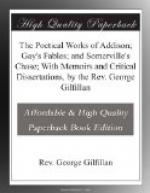For eight years, old Addison lingered in loathed Tangier; nor, when he returned to England on a visit, had he any purpose of permanently residing in his own country. But his appointment was hastily bestowed on another; and it was fortunate for him that a private friend stepped in and presented him with the living of Milston, near Ambrosebury, Wilts, worth L120 a-year. This, which Miss Aiken calls a “pittance,” was probably equivalent to L250 now. At all events, on the strength of it, he married Jane, daughter of Dr Gulstone, and sister to the Bishop of Bristol, who, in due time, became the mother of our poet. Lancelot was afterwards made Prebendary of Salisbury Cathedral, and King’s Chaplain in ordinary; about the time (1675) when he took the degree of D.D. Subsequently he became Archdeacon of Salisbury, and at last, in 1683, obtained the Deanery of Lichfield. But for his suspected Jacobitism, he would probably have received the mitre. He died in 1703.
Joseph had two brothers and three sisters. His third sister, Dorothy, survived the rest, and was twice married. Swift met her once, and with some awe (for he, like all bullies, had a little of the coward about him), describes her as a kind of wit, and very like her brother. The Spectator seems to have been a wild and wayward boy. He is said to have once acted as ringleader in a “barring out,” described by Johnson as a savage license by which the boys, when the periodical vacation drew near, used to take possession of the school, of which they barred the doors, and bade the master defiance from the windows. On another occasion, having committed some petty offence at a country school, terrified at the master’s apprehended displeasure, he made his escape into the fields and woods, where for some days he fed on fruits and slept in a hollow tree till discovered and brought back to his parents. This last may seem the act of a timid boy, and inconsistent with the former, and yet is somehow congenial to our ideal of the character of our poet. It required perhaps more daring to front the perils of the woods




